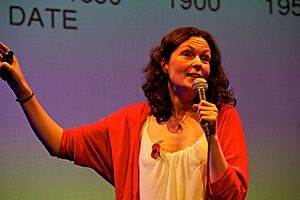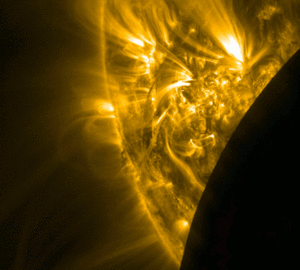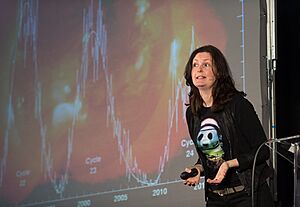Lucie Green facts for kids
Quick facts for kids
Lucie Green
|
|
|---|---|

Green talking at Bright Club in London, November 2011
|
|
| Born |
Lucinda May Green
1975 (age 49–50) Bedfordshire, England, UK
|
| Education | Dame Alice Harpur School |
| Alma mater | University of Sussex University College London |
| Occupation | Science Communicator |
| Employer | Mullard Space Science Laboratory |
| Television | Presenter, The Sky at Night |
| Board member of | European Solar Physics Division of the European Physical Society Science Museum |
| Spouse(s) |
Matthew Parker
(m. 2014) |
| Awards | Kohn Award (2009) Suffrage Science award (2015) Meitner Medal (2017) |
Lucinda "Lucie" May Green (born around 1975) is a British expert who studies the Sun. She is a solar physicist. She also helps people understand science, which means she is a science communicator.
Lucie Green is a Professor of Physics. She works at the Mullard Space Science Laboratory (MSSL). This lab is part of the University College London (UCL). She leads MSSL's programs that teach the public about space. She also helps guide the Science Museum.
In 2013, Lucie Green made history. She became the first female presenter of The Sky at Night. This famous TV show is all about astronomy. Her research mainly looks at the Sun's atmosphere. She studies huge bursts of energy called coronal mass ejections. She also investigates how the Sun's magnetic field causes these powerful events.
Contents
Early life and education
Lucie Green went to Dame Alice Harpur School in Bedfordshire, England. She did very well in her studies there. After school, she first studied art. But later, she decided to follow her passion for physics.
She earned a degree in physics with astrophysics from the University of Sussex. In 2002, she finished her PhD. Her PhD was in solar physics, which is the study of the Sun. She completed it at the MSSL, UCL.
Lucie Green often visits her old school. She talks to students about her research. Her former physics teacher, Fiona Clements, is very proud. She said Lucie is a great example for young women in science.
Lucie shared that she always loved physics. She enjoyed solving problems and finding answers. She didn't plan to be a space scientist at first. She wasn't even into amateur astronomy back then.
Career and solar research

After getting her PhD, Lucie Green worked at Cardiff University. She helped run the Faulkes Telescope Project. This project lets schools use powerful telescopes far away. These telescopes are in Hawaii and Australia. Students can control them from their classrooms.
Today, Lucie Green is a Professor of Physics at MSSL. She studies the magnetic fields in the Sun's atmosphere. Sometimes, these fields erupt. This causes huge explosions called coronal mass ejections. She researches how these explosions affect Earth. She also looks at what this means for people living here.
From 2006 to 2012, she was part of the Royal Society's Education Committee. She helped create reports about science education. She also leads MSSL's programs to share science with the public.
Solar Orbiter mission
Lucie Green is helping with the Solar Orbiter mission. This is a special satellite built by the ESA. Its job is to study the Sun up close. The mission aims to understand the Sun's behavior better. It will also study the heliosphere, solar winds, and the Sun's magnetic field.
Media appearances
Lucie Green often appears on TV and radio. She is well-known for The Sky at Night. She has also been on Stargazing Live, Stardate, and Horizon. On radio, she has appeared on The Infinite Monkey Cage and PM.
Between 2004 and 2005, she co-hosted Stardate shows. One episode was "Stardate: Mission To Titan". She explained how the Huygens probe landed on Titan. Titan is Saturn's largest moon. Another show, "Stardate: Deep Impact", covered a NASA probe hitting comet Tempel 1. This helped scientists learn about the Solar System's beginnings.
Since 2010, Lucie Green has been on Stargazing Live. She has also appeared on The Infinite Monkey Cage. On this show, she discussed topics like parallel universes.
In 2013, she hosted her own radio show called Solar Max. It was on BBC Radio 4. The show explained space weather. This is how the Sun's emissions can change Earth's magnetic field. She talked about what these changes mean for us.
Personal life
When asked about her love for space science, Lucie Green shared a fun story. As a child, her parents thought she would be an astrophysicist. She agreed, even though she didn't know what it meant. At that time, she really wanted to care for animals. She used to feed worms to injured birds!
In 2014, Lucie Green married Matt Parker. He is a stand-up comedian and also explains maths. Their wedding rings were made from meteoric iron. This is metal from a meteorite.
Awards and honours
In 2005, Lucie Green was part of a team that won an award. It was a Royal Television Society award. They won for a TV show about the transit of Venus. The show let viewers measure the Sun-Earth distance. They used observations of the transit that year.
Lucie Green has won awards for sharing science with the public. In 2009, she received the Royal Society's Kohn Award. This award recognized her great work in engaging many different people with science. It also praised her for creating a culture of public engagement in her department.
In 2010, The Times newspaper named her one of the UK's top ten science educators under 40.
In 2015, a sculpture of Lucie Green was revealed. It was at the Royal Society in London. This happened at an event about women in science writing. That same year, she won an Engineering and Physical Sciences Suffrage Science Award.
In 2017, Lucie Green won the Lise Meitner Medal and Prize. This award is from the Institute of Physics.
See also
 In Spanish: Lucie Green para niños
In Spanish: Lucie Green para niños


